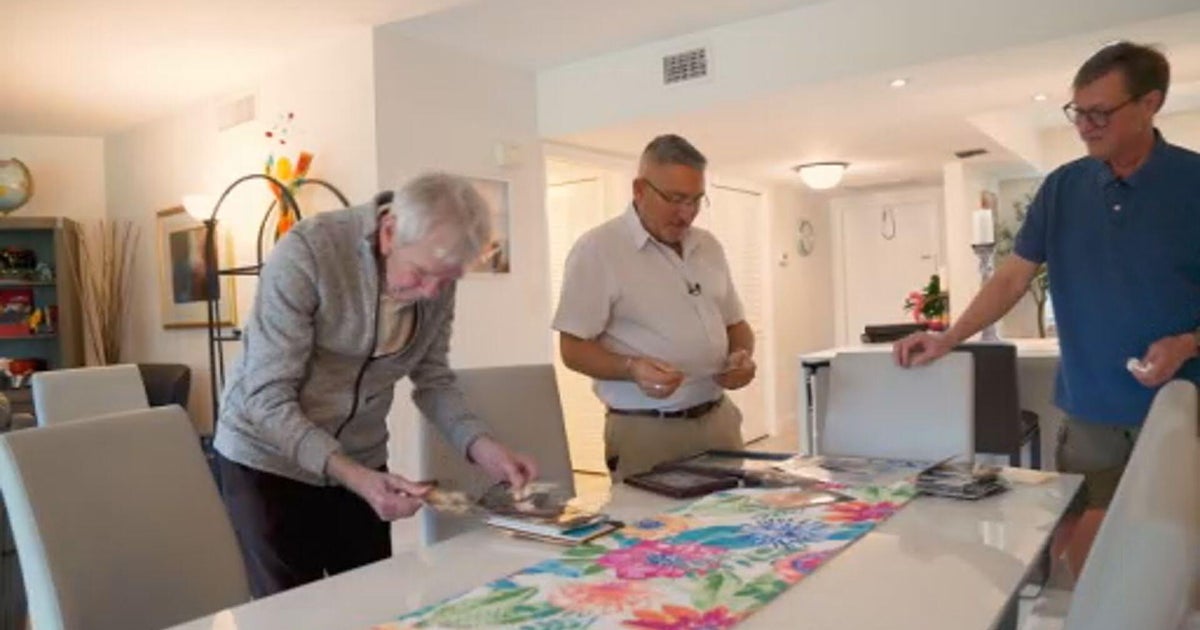Frustration, exhaustion, resentment and love – these are all very real feelings for people who watch over their loved ones who are living with Parkinson’s disease.
The overwhelming majority of people living with Parkinson’s will need a caregiver at some point as they navigate the disease. One study has found that 88% of men with Parkinson’s and 79% of women have a caregiver. The study also found they have a higher quality of life than those without help.
But, as CBS News Miami has found, the life of a caregiver can be very demanding and difficult.
A caregiver’s devotion: One man’s journey supporting his partner
Jeff Lee and Roger Miller’s story began in Miami 34 years ago when they met through church while working at neighboring hospitals: Lee a nurse at the VA and Miller a chaplain next door at Jackson Memorial Hospital.
“We agreed to meet and went to lunch at Hardee’s in Downtown Miami, so we had our first meeting at Hardee’s,” laughed Lee.
Since then, they’ve traveled the world together: they’ve loved, laughed and faced challenges side by side for decades. Then, in 2015, perhaps their biggest challenge: Miller was diagnosed with Parkinson’s disease.
“I was noticing changes in behavior, changes in being able to hold things tightly, I’d drop things. Changes in my voice,” Miller said.
Both of their lives changed dramatically in just a few years.
Now, Lee’s day, every day and night, is consumed with taking care of Miller. That means four times a day, giving him his Parkinson’s medicine on time — on a strict schedule.
“If he gets too far off that schedule, his symptoms — tremor, drooling — those symptoms get much worse,” Lee explained.
And at times, there’s more.
“He has a lot of drooling and you have clothes and at night he has overactive bladder. So you’re up all night dealing with the overactive bladder,” Lee said.
And one of the biggest worries: Miller falls, breaking his hip for the first time in October.
“You’re totally constrained with everything you do because you really have to be responsive to the needs of the individual. And you have to put your needs second,” Lee noted.
It’s a 24/7 job.
“There’s no sleeping late because you have to have food for him ready to eat so he can take his medicine at 8 o’clock. You have to do blood pressure checks,” Lee said.
Lee is by no stretch complaining. He’s describing life as a caregiver, and it’s not always easy.
“I’ve always been a self-care person. I used to go to the gym… can’t do that anymore,” he said.
Walking the dog for 15 minutes is a chance for Lee to carve out some time for himself. Self-care is very limited..
“Once I get him in bed at night my relaxation time is just lying down in bed using my iPad, that’s about it,” Lee said.
So why do it?
“It’s a struggle. But, you understand that’s part of living, part of loving, part of caring, part of giving,” he said.
A sister’s emotional journey caring for her brother
Robert Gardner is living with Parkinson’s disease. His sister, Susan Stocker, is his caregiver. Until Last October, he was on his own in Asheville, North Carolina, for the last 30 years, then came Hurricane Helene.
“Started to get some phone calls from friends, neighbors that Gardner wasn’t doing well. There was no power. There was no running water. And my husband Mike and I decided, let’s go. We dropped everything. We loaded up the car with hundreds of dollars of supplies and food,, and we drove 12 straight hours to Asheville,” Stocker said.
After one night, Stocker and her husband Mike realized Gardner could not live alone: he was falling, making life dangerous and he was off schedule with his meds.
“Physically, it was getting more and more difficult to be living alone, and you know, friends are friends and you can only ask them to pick you up off the floor so many times, and so there was those inclinations to get closer to family,” Gardner said.
They packed him up and moved him to Hollywood, and Stocker’s life was about to radically change.
“This caregiving is no joke,” she said. “It’s such like a sweet phrase to be a caregiver, but it’s exhausting, it’s frustrating.”
One night stands out for Stocker, she wished she could have a “do-over.”
“I heard Robert calling out for help. And I didn’t want to bother my husband because he had to get up early for work the next day and I walked into Robert’s room and he was on the floor,” she recalled.
Stocker tried getting him up on her own.
“I was not patient with him, regretfully, you know, it was, it was not a good moment. I was, I was losing it. And usually I’m very gentle picking him up. I was not gentle that night and I was furious with myself. I had to, I had to stop. I had to. Go into another room and I had to calm down. I had to calm myself down,” she said.
But there’s a reason she does this: ‘It’s definitely about love and it’s about letting go of your ego and you know, they say, that in the word ‘family’, you have to remove the letter I and think of others, not yourself.


